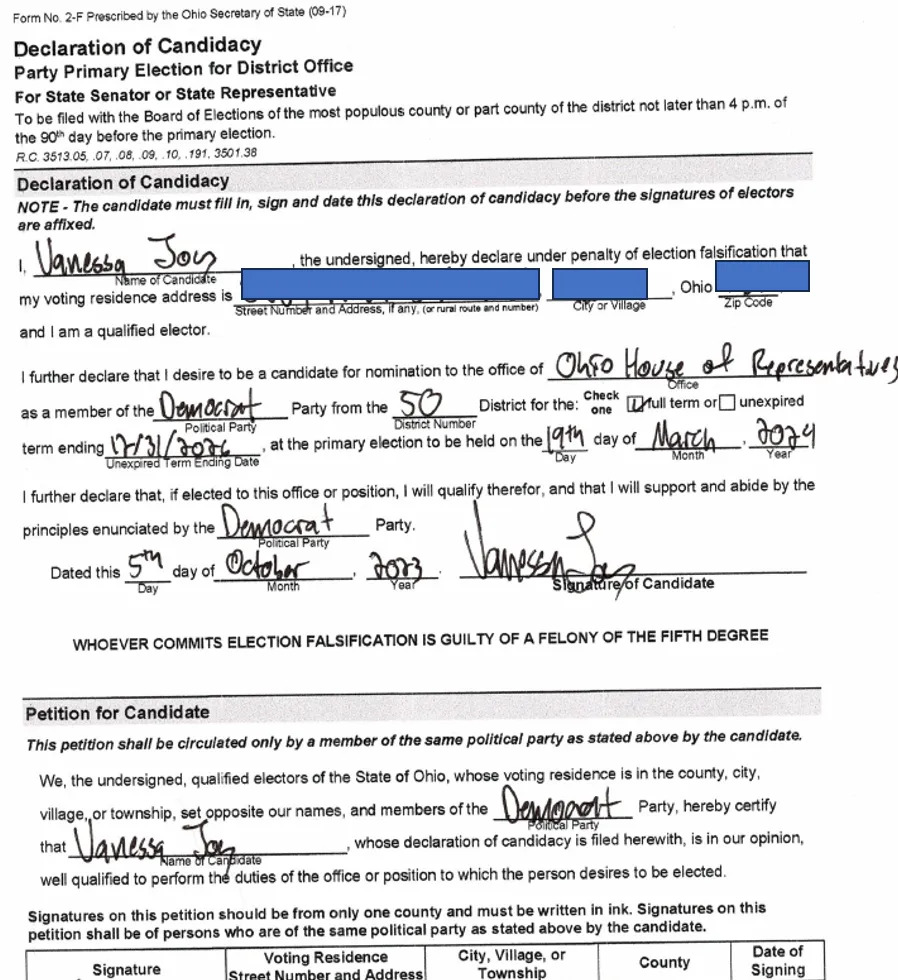Truthout is an indispensable resource for activists, movement leaders and workers everywhere. Please make this work possible with a quick donation.
In Ohio, a transgender candidate was removed from the ballot for not including her previous name under a seldom-used, decades-old law. Vanessa Joy was informed on Wednesday that, despite collecting enough signatures to run, her petition to run for office was denied by the Stark County Election Commission according to news first reported by local journalist Morgan Trau of Ohio. The law requires any candidate running for office to include name changes on their petition if the name change occurred within the last five years. At least two other transgender candidates could be impacted by this law, which seems to have been selectively enforced against Joy.
The law, enacted in 1995, mandates that any candidate who has had “a change of name within five years immediately preceding” filing for office must list their former name in the nominating petition. This effectively requires all transgender candidates to list their deadname — the name transgender people typically abandon when they transition — on their petitions. This requirement is waived for many reasons, including name changes due to marriage. There is no such exception for transgender people.
Joy, who was running for House District 50 in Stark County, successfully collected enough signatures for office. She had no primary challenger, meaning she was going to automatically become the party’s nominee in the district. She was slated to run against Matthew Kishman after the previous officeholder, Representative Reggie Stoltzfus, announced a run for congress, leaving the office vacant. Now, because her petition was denied, she cannot even run as a write-in candidate in the district due to Ohio laws barring candidates with disqualified petitions from write-in campaigns.
Joy, when asked about the decision, tells Erin In The Morning that there was no information that such a signature was required. The 33 page candidacy guide put out by the secretary of state does not list any such requirement and listed on the Stark County website has no such information. The candidacy petition form does not have any space for listing an old name, either. Joy provided copies of her form showing that indeed, there is no indication or space for listing an old name, as you can see here:

Vanessa Joy, when asked about the action taken by the local county commission, states that she is “one of the first, if not the first, people that this law has been applied to in Ohio.”
The law appears to have been selectively enforced against Joy – other transgender candidates do not appear to have had their candidacies disqualified by the law. It is unclear if action may be taken against those candidates after their petitions have been accepted, however; the Republican party of Ohio could potentially weaponize this against trans candidates across the state.
Ohio is not the only state where this issue may arise. At least one other state has a similar filing requirement, although the requirement does not appear to be in place in most states. Michigan’s election law includes a provision that states that name changes within 10 years must be disclosed. Michigan’s law also waives those requirements for people changing their name because of marriage:

When asked about her next steps, Joy says, “I’m still exploring options, but my hope is that I can get legal representation to challenge the wording of this law and make it more inclusive to trans folx. The law already has an exception for changing names via marriage, and for people who have already notified voters of the name change on previous petitions.”
This piece was republished with permission from Erin In The Morning.
A terrifying moment. We appeal for your support.
In the last weeks, we have witnessed an authoritarian assault on communities in Minnesota and across the nation.
The need for truthful, grassroots reporting is urgent at this cataclysmic historical moment. Yet, Trump-aligned billionaires and other allies have taken over many legacy media outlets — the culmination of a decades-long campaign to place control of the narrative into the hands of the political right.
We refuse to let Trump’s blatant propaganda machine go unchecked. Untethered to corporate ownership or advertisers, Truthout remains fearless in our reporting and our determination to use journalism as a tool for justice.
But we need your help just to fund our basic expenses. Over 80 percent of Truthout’s funding comes from small individual donations from our community of readers, and over a third of our total budget is supported by recurring monthly donors.
Truthout has launched a fundraiser to add 500 new monthly donors in the next 9 days. Whether you can make a small monthly donation or a larger one-time gift, Truthout only works with your support.
